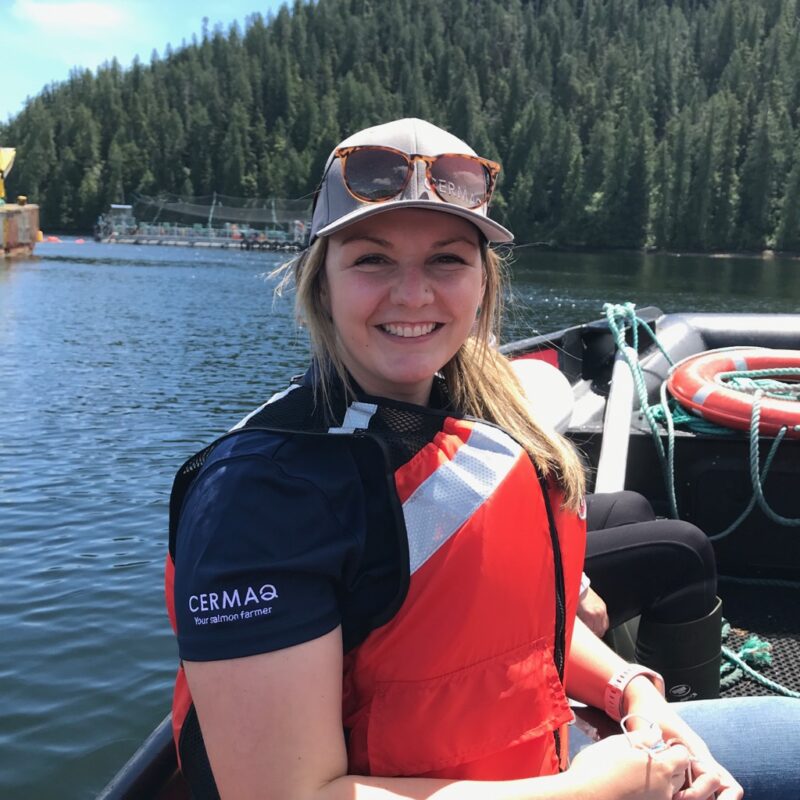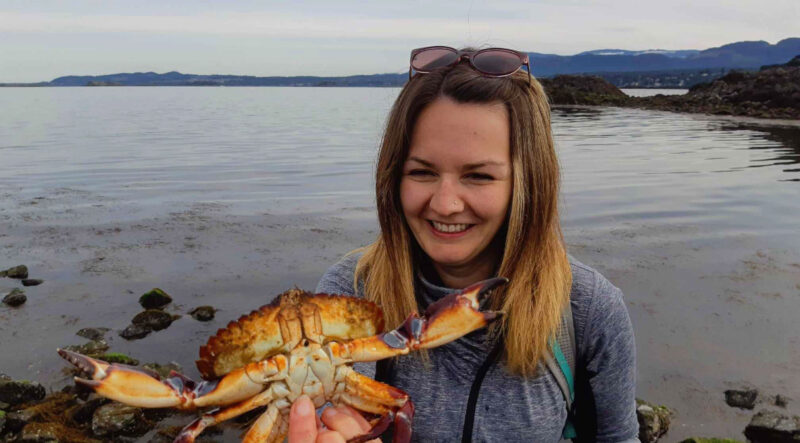THIS IS SALMON FARMING with EMILY WARREN
“A big misconception I hear is that the people working in the fish farming industry don’t care about the ocean or the environment in general, which couldn’t be further from the truth!”
By: Samantha Bacchus McLeod
SeaWestNews
Aquaculture is responsible for thousands of high-paid, skilled, and rewarding jobs across British Columbia. As the demand for sustainable and affordable farmed salmon grows worldwide, there is a fit for virtually any career path in this industry. In the fourth of our Q&A series with young professionals in BC’s salmon farming sector, we speak with Emily Warren, Licence & Development Officer, Cermaq Canada.
How long have you been in this position?
I have been in this position for almost 3 years now, I am based in Campbell River on Vancouver Island, BC., where I manage the licences and permits the sea-sites and hatcheries need to operate, as well as help with environmental monitoring, regulatory reporting, and funding and development for new projects.
Where did it all start, your journey to aquaculture?
I am originally from Toronto and after high school I moved to the East coast of Canada where I completed my Bachelor of Environmental Biology at the University of Prince Edward Island (UPEI). As I got further into my biology degree. I started to get more into the marine biology realm which has always fascinated me, and this is where I learned about aquaculture for the first time and was hooked. After UPEI, I moved to Vancouver Island on the West coast to take the post-degree diploma in Fisheries and Aquaculture at Vancouver Island University, and from there I did my M.Sc. at the University of Victoria researching sea urchin aquaculture.
What hooked you about an aquaculture career?
I wanted to pursue this career in aquaculture because I find it to be such a dynamic industry with lots of opportunity and I am so passionate about being able to sustainably produce healthy and tasty seafood for Canadians – and getting to work by the ocean every day is a pretty good bonus too!
What are two opportunities you see for your industry, here in British Columbia?
With the federal transition plan surrounding aquaculture, I see it as an opportunity to move this industry into a space it’s never been in before. We need to be creative and be continually innovating to adapt to many challenges such as climate change. So, I see new technology like semi-closed systems, and new farming methods, such as co-production and/or integrated multi-trophic aquaculture as opportunities moving forward.
What types of technological advancements or innovations have you seen in salmon farming since you have been in the industry, and how have they influenced your work?
As mentioned earlier, one of the technological advancements that has interested me the most, is the adoption and trial of a semi-closed containment system.
This system is the first of its kind in Canada and is a circular cage system enclosed by a polymer bag that minimizes the interaction the fish will have with the outside environment. The system also allows for complete control of water quality due to many sensors that monitor salinity, dissolved oxygen, and temperature. I am excited to see how this technology is further developed in the future of salmon farming!
What are some misconceptions or misunderstandings people may have about salmon farming, and how do you educate the public about it?
A big misconception I hear is that the people working in the fish farming industry don’t care about the ocean or the environment in general, which couldn’t be further from the truth!
The industry is made up of so many academics, researchers, veterinarians, and people who grew up in rural areas and just love fishing and being on the ocean every day. Everyone I have met in the industry is so passionate about ocean conservation and protecting this environment and the species that they love, while also producing sustainable seafood.
Can you tell us about a couple of challenges you face as a young salmon farmer in British Columbia?
One challenge I face, which I’m sure won’t come as a surprise, is the difficult political climate we are working in, here in British Columbia. As salmon farmers, we just want to produce sustainable, healthy fish and to keep innovating with new technology to become the most sustainable and environmentally friendly food production industry. Currently, there’s lots of barriers not rooted in science, preventing us from achieving our goals.
The other challenge would stem from this, which is that it’s mentally difficult to deal with the constant misinformation, and you really need to be passionate and resilient about your work, that you really need to keep fighting for it.
Could you share a couple of insights into the sustainable practices and environmental considerations that are important in salmon farming?
In my role, I help with the reporting requirements as part of our conditions of licence to operate. One aspect of that reporting is regarding the benthic (seabed) conditions at our sites, we are strictly regulated in this aspect. Under our farms after each production cycle, we are not allowed to restock until attain a regulated threshold.
Another insight would be that we regularly conduct ROV habitat surveys and bathymetry surveys, to know what is under our farms to operate in the best way possible to minimize any potential impact.
How do, or would you balance the economic aspects of salmon farming with the need for environmental stewardship and conservation?
In my opinion, it’s important to realize that you can have a productive industry while also contributing to stewardship and conservation in the environment you work in.
While it can be a tricky balance, I believe it can be done through continually innovating, improving, and solving problems in novel ways. This can involve bringing in new technology that, for example, reduces greenhouse gas emissions while producing better in-water conditions for our fish, and then also new farming methods like co-production or integrated multi-trophic aquaculture.
There are also initiatives already happening where if we were to apply for a site in a new area, then we need to look at the “ecological off-set” and do an equivalent area of work somewhere else i.e., eel grass restoration or beach cleanups.
And here are the last two questions, first up, what do you love to do that is not work-related?
When I’m not working, I love being out on the water, whether that is boating, fishing, snorkelling, or paddleboarding.
And lastly, do you have a go-to salmon recipe you could share with us? Or do you have a favourite sushi place you frequent in Campbell River?
Currently my favourite salmon recipe to make are “salmon bowls”. I just take some Atlantic salmon sprinkled with Cajun spice and air fry it. Once cooked I shred into smaller pieces. Then I add this to a rice bowl with shredded carrot, cucumber, edamame, and corn. I like to top it with a sauce, pickled ginger, and toasted sesame seeds.
However, if I am going out for sushi, then Sushi Mong in Campbell River is the place to go!

Images: Emily at play , and Emily at work.

